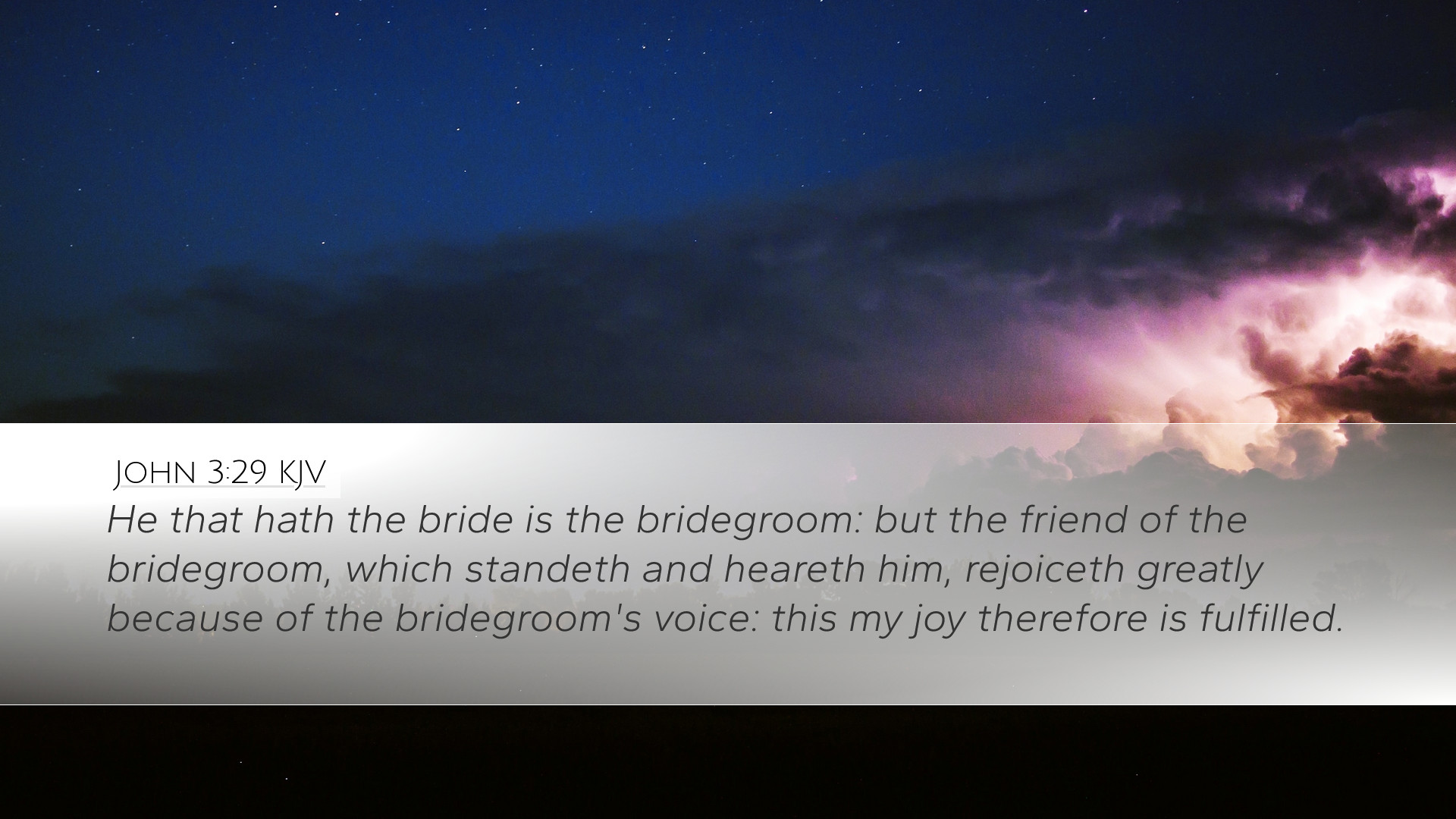Commentary on John 3:29
John 3:29 (ESV): "The bride belongs to the bridegroom. The friend who attends the bridegroom who stands and hears him rejoices greatly at the bridegroom's voice. Therefore this joy of mine is now complete."
Introduction
This verse captures a profound moment in the ministry of John the Baptist as he identifies the significance of Jesus Christ’s role in the redemptive narrative. It reflects the joy and fulfillment found in recognizing one’s place within God’s plan. Through the lens of multiple esteemed commentators, we will explore the multifaceted layers of meaning in this verse.
The Context of John 3
The third chapter of the Gospel of John delves into the themes of new birth and the revelation of Christ as the light of the world. It includes the famous dialogue between Jesus and Nicodemus, illustrating the transition from the old covenant to the new. John 3:29 highlights John the Baptist's acknowledgment of Jesus as the Messiah and the completion of his own mission.
Insights from Matthew Henry
Matthew Henry reflects on the celebratory nature of the relationship between the bridegroom and the bride. He emphasizes that John sees himself as the friend, or best man, whose joy is rooted in the bridegroom's success. This demonstrates a humble recognition of one's role in serving God’s plan:
- Role Recognition: John recognizes that his ministry, while significant, is subordinate to Christ. This humility exemplifies the essence of true leadership in the kingdom of God.
- Joy in Christ's Ministry: The joy that John experiences is not a fleeting emotion but a deep sense of fulfillment—Joy is accentuated as he aligns himself with the divine purpose and takes pleasure in the success of the bridegroom.
- Connection to Israel: The imagery of the bride reflects the covenant relationship between God and Israel, where Jesus emerges as the long-awaited fulfillment of that promise.
Insights from Albert Barnes
Albert Barnes elaborates on the symbolism of the bride and bridegroom, noting that it captures the relationship between Christ and His Church. He offers detailed comments on how belief in Jesus fulfills the heart's longing:
- Symbolism of the Bride: The bride, indicative of the Church, signifies those who receive Christ's love and grace, highlighting the intimacy of the believer's union with Christ.
- Metaphorical Joy: The metaphor of a wedding encompasses joy, celebration, and completeness, illustrating that John’s ministry contributed to this divine union rather than detracting from it.
- Fulfillment of Prophecy: Barnes emphasizes that John's role was to prepare the way for Christ. By acknowledging Jesus as the bridegroom, John reaffirms the fulfillment of messianic prophecies.
Insights from Adam Clarke
Adam Clarke offers a reflective analysis on the text, pointing out the cultural significance of weddings in Judaic tradition and the applicable spiritual truths:
- Weddings in Jewish Culture: Clarke notes that weddings were significant events laden with joy and community. In this context, acknowledging Jesus as the bridegroom is a declaration of His prominent place in salvation history.
- Emotional Joy: The friend of the bridegroom experiences pure joy at the bridegroom's happiness. Clarke emphasizes that this signifies John’s recognition of the fulfillment of God’s plan, echoing a theological harmony.
- Conclusion of a Mission: The statement "my joy is now complete" not only points to John’s personal satisfaction but also indicates a divine orchestration where each part plays its role to bring glory to God’s purpose.
Theological Implications
The metaphorical language and the rich cultural context bring forth significant theological implications around identity, mission, and fulfillment:
- Identity in Christ: Believers are part of the bride of Christ, signifying a covenant relationship that demands a response of joy and devotion.
- Mission and Joy: John's role illustrates the completion of one's mission as tied to the greater narrative of God's redemptive work—joy is found in fulfilling God’s calling.
- Celebration of Jesus’ Ministry: The acknowledgment of Jesus as the bridegroom transforms the perception of His ministry, highlighting joy and fulfillment in relationship over religion.
Application for Today's Believers
For pastors, theologians, and students of the Word, the lessons from John 3:29 can be transformative:
- Joy in Service: Believers are called to find joy in their function within the body of Christ, rejoicing in what God is doing through others.
- Humility and Perspective: Understanding that all ministry serves to lift Jesus up rather than oneself reminds us of our place in God’s grand narrative.
- Engagement in the Church: The identity of the Church as the bride encourages commitment to community and spiritual growth, fostering relationships that reflect Christ’s love.
Conclusion
John 3:29 is a profound statement that encapsulates not just the joy of John the Baptist, but the foundational truth of the Christian faith: Jesus is the bridegroom who invites believers into an intimate, unbreakable relationship. From the insights of noted commentators, it is clear that the themes of joy, fulfillment, and divine purpose resonate throughout the passage. As we reflect on this verse, may it inspire a deeper understanding of our relationship with Christ, propelling us toward a joyful engagement in His mission.


